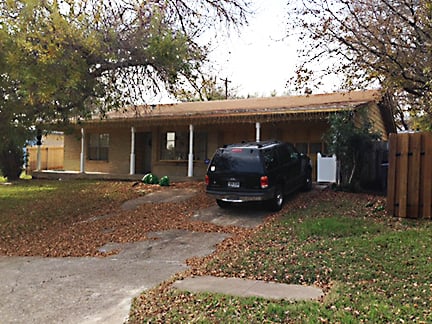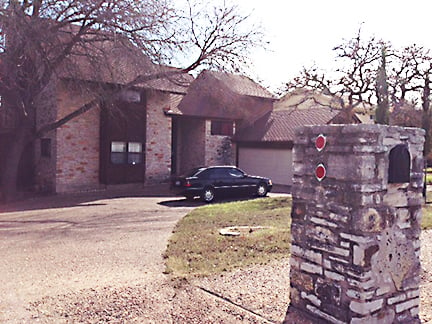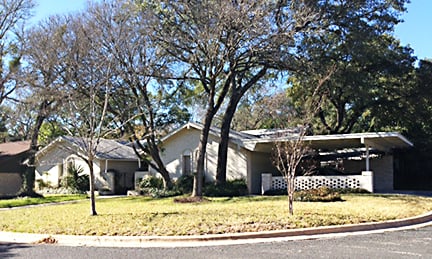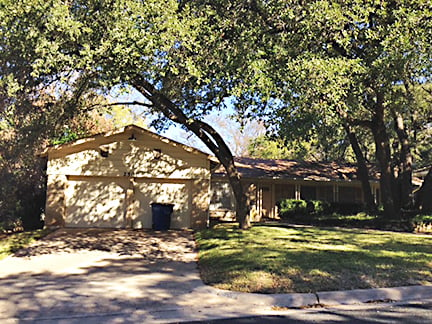Save Our Springs Alliance files complaint a day before vote to fund State Highway 45 project

The Save Our Springs Alliance filed a criminal complaint with the Travis County Attorney’s Office today, alleging that Travis County Commissioner Gerald Daugherty had violated the Texas Public Information Act by not turning over his correspondence related to the proposed controversial State Highway 45 Southwest. (See: SOS Alliance Criminal Complaint re: Travis County Commissioner Gerald Daugherty)
The complaint came the day before the Travis County Commissioners Court could vote to approve an initial payment of $2.5 million to help pay for design and construction of SH45 SW and to be obligated to pay an additional $12.5 million by October 30.
The SOS Alliance has long opposed the construction of SH45 SW over the sensitive recharge zone of the Barton Springs Edwards Aquifer. Daugherty has spearheaded efforts to get SH45 SW built.
The timing of the vote is important, given the recent Democratic Primary election. Former Travis County Commissioner Sarah Eckhardt is the Democratic nominee for county judge, and former City Council Member Brigid Shea is the party’s nominee for the Precinct 2 county commissioner’s seat that Eckhardt vacated to run for county judge. Both are unlikely to support the new highway.
In the November 2014 general election both have Republican opponents: Eckhardt faces Mike McNamara and Shea faces former Travis County Sheriff Raymond Frank.

The complaint, signed by William G. “Bill” Bunch, executive director of the SOS Alliance, alleges that Daugherty failed to turn over correspondence related to SH45 SW that the Alliance had asked for in a public information request May 10, 2013.
Commissioner Daugherty told The Austin Bulldog the criminal complaint “is nothing more than a rehash of the allegations they brought in the civil suit. I don’t put anything past Bill Bunch or the SOS organization to thwart the will of the people,” he said, referring to efforts to halt construction of SH45 SW.
County Attorney David Escamilla, to whom the SOS Alliance’s complaint was addressed, confirmed that he had received the complaint but could not comment.

Attorney Randy Leavitt of the Law Office of Randy Leavitt confirmed that he is representing Daugherty in this matter.
Leavitt was one of three attorneys hired to represent the City of Austin when the mayor and City Council members were being investigated by the Travis County Attorney’s Office for violations of the Texas Open Meetings Act exposed by The Austin Bulldog’s investigative report of January 11, 2011.
Civil lawsuit against Daugherty
The SOS Alliance filed a lawsuit November 12, 2013, Cause No. D-1-GN-13-003876, alleging that Daugherty failed to provide requested records, for example e-mails related to the SH45 SW project that had been exchanged on the commissioner’s personal account.
Bunch and SOS attorney Adam Abrams deposed Daugherty on February 20, 2014, in the presence of a court reporter. The commissioner was represented by Assistant County Attorneys Anthony Nelson and Andrew Williams. (See: SOS Alliance v. Daugherty Oral Deposition.) The deposition is not final, however, until Daugherty and his attorney have reviewed it and had the opportunity to make corrections, Leavitt said.
The criminal complaint states that Daugherty admitted in the deposition that he uses his personal cell phone account for county business, that he used a laptop computer for county business and donated the computer without saving messages on it, that he deleted messages from his Travis County e-mail address relevant to SH45, and that he deleted text messages referencing county business.
The deletion of messages required to be kept is permissible only if copies are stored elsewhere and made available in response to a public information request, subject to exceptions provided for in the Texas Public Information Act.
The Local Government Records Act establishes a retention schedule for such records. The SOS Alliance claims Daugherty, who is the official records custodian for his office, has not retained the records for the required two years.
The SOS Alliance’s criminal complaint states that Daugherty has violated the Local Government Records Act by not retaining correspondence concerning county business and has thereby allegedly committed a misdemeanor punishable by Section 552.351 of the Texas Public Information Act.
Section 552.351 states “a person commits an offense if the person willfully destroys, mutilates, removes without permission as provided by this chapter, or alters public information. An offense under this section is a misdemeanor publishable by: a fine of not less than $25 or more than $4,000; confinement in the county jail for not less than three days or more than three months; or both the fine and confinement.”
Special prosecutor possible
A couple of past cases may foreshadow how the SOS Alliance’s complaint against Commissioner Daugherty might be handled.

In August 2004, County Judge Sam Biscoe was arrested for driving while intoxicated. DWI offenses are normally prosecuted by County Attorney Escamilla’s office. But because the County Commissioners Court chaired by Biscoe approves the county attorney’s budget, Escamilla recused himself from the case. At that point it’s up the courts to appoint a special prosecutor. (The charge was ultimately dismissed based on Biscoe’s medical condition.)
Last November, the SOS Alliance filed a criminal complaint against Judge Biscoe for failing to file his personal financial statement. Failure to file a statement on time is a Class B misdemeanor. Once again the county attorney’s office was recused. Biscoe filed the statement after the complaint was filed.
Public information case has precedents
Although no criminal complaints were filed in two other cases in Central Texas, the lawsuit against Daugherty is based on the same grounds: failure to turn over communications about government business conducted on private devices or private accounts.
The Austin case—On March 1, 2011, The Austin Bulldog sued Mayor Lee Leffingwell, each City Council member, and the City of Austin over the citys’ refusal to turn over messages the elected officials exchanged about city business on private e-mail accounts between January 1, 2010, and January 27, 2011.
The city maintained that it did not collect, assemble, or maintain e-mails exchanged on private accounts and did not have legal access to those e-mails. The claim seemed inappropriate on its face given that The Austin Bulldog’s public information request for those records was addressed to the elected officials as well as the city. These elected officials are the official custodians of the records in their offices.
In the wake of The Austin Bulldog’s lawsuit and during the county attorney’s open meetings investigation the elected officials individually turned over widely varying numbers of e-mails they had exchanged about city business on their private e-mail accounts during the 13-month period.
In addition, a Council Resoluton Adopted April 7, 2011 ordered reforms to the City Council’s own electronic communications policies. Further, the resolution ordered the City Manager to reform e-mail practices for the city’s 12,000 employees and ordered the City Clerk to reform practices for the appointed members of the city’s boards and commissions.
The Austin Bulldog’s lawsuit is still pending in the Third Court of Appeals to resolve the issue of whether the public officials’ private e-mail addresses legally can be redacted, or blacked out, as they were in the messages the mayor and council members had exchanged about city business on private e-mail accounts. The appeal argues that allowing those e-mail addresses to be obliterated when responding to a public information request prevents discovery of whether elected officials participated in an illegal quorum discussion about city business using their private e-mail accounts—a violation of the Texas Open Meetings Act.
Bexar County case—The San Antonio Express-News requested e-mails about county business that Bexar County Commissioner Tommy Adkisson had sent or received on his personal e-mail account. The county requested an opinion from the Texas Attorney General, who ruled the e-mails were subject to the Texas Public Information Act and must be released.
Adkission refused and instead sued the attorney general in Adkisson v Abbott, Cause No. 03-00535-CV. The trial court confirmed the attorney general’s opinion and ordered release of the commissioner’s e-mails. Adkisson then filed an appeal with the Austin-based Third Court of Appeals.

Adkisson’s appeal was argued before the court in October and the decision is still pending, said attorney George Hyde of the Austin law firm Denton Navarro Rocha Bernal Hyde & Zech PC, who represents Commissioner Adkisson.
Legislative action—In 2013, the Texas Legislature passed Senate Bill 1368 and the governor signed it into law in June.
The bill requires that in responding to public information requests, public officials must provide e-mails about government business that are sent or received on private devices unless the subject matter otherwise qualifies to be withheld. In other words, electronic communications relating to official business will be accessible by law to the public, even if sent from a private e-mail account or mobile device.
Daugherty was elected to county commissioner in November 2012 and took office in January 2013.
SB 1368 became effective September 1, 2013.
This report was made possible by contributions to The Austin Bulldog, which operates as a 501(c)(3) to provide investigative reporting in the public interest. You can help sustain The Austin Bulldog’s reporting by making a tax-deductible donation.
Related Bulldog coverage: This is the 43rd story covering local government agencies’ problems and progress in dealing with open government issues.
Bulldog Open Records Lawsuit Continues: Key issue is whether it is permissible to redact officials’ private e-mail addresses, June 7, 2013
Social Media’s Impact on Open Government: Few government organizations have dealt with how Facebook, Twitter use affects compliance, April 23, 2013
City Hosts Open Government Symposium: Lawyers attending for education credits abound, much of the day had little to do with city practices, April 22, 2013
City Spent $157,636 to Defend Council Violations: Payments for private lawyers for mayor, council members in criminal investigation, April 8, 2013
City Hosting Open Government Symposium: Follows county attorney’s investigation of City Council open meetings violations, March 19, 2013
Open Meetings Investigation a Year Old Today: County attorney says investigation of whether City Council violated Open Meetings Act is still ongoing, January 25, 2012
Employee E-Communication Policy Drafts Show Each Revision Weakened Rules: Policy that was near fully compliant on first draft crippled by changes, September 13, 2011
Taxpayers Footing Big Bills to Correct City of Austin’s Open Government Issues: $200,000 spent on attorneys so far and no end in sight, June 24, 2011
Council Staff Training Lapsed from 2007 Until Lawsuit Filed: Only one current staff member had taken training, city records show, April 20, 2011
Council Member Bill Spelman Goes On the Record About Private Meetings, Fifth in a series of recorded question and answer interviews, February 20, 2011
Council Work Sessions Stir Concern Over Tying Up Staff for Two Meetings: City manager presents summary of options for council consideration, February 15, 2011
Mayor Claims Lawyers Okayed Private Meetings But City Won’t Release Proof: City pledges cooperation with county attorney’s inquiry but is withholding these key documents, February 13, 2011
County Attorney Asks City of Austin for Records Related to Open Meetings Complaint: Former Mayor Wynn and Former Council Member McCracken included, February 9, 2011
Council Member Randi Shade Goes On the Record About Private Meetings: Fourth in a Series of recorded question-and-answer interviews, February 9, 2011
City of Austin Commits $159,000 for Advice in County Attorney’s Open Meetings Act Inquiry: Three attorneys hired for $53,000 each, February 7, 2011
Council Member Chris Riley Goes On the Record About Private Meetings: Third in a Series of recorded question-and-answer interviews, February 6, 2011
Council Member Sheryl Cole Goes On the Record About Private Meetings: Second in a Series of recorded question-and-answer interviews, February 3, 2011
Mayor Pro Tem Mike Martinez Goes On the Record About Private Meetings: First in a series of recorded question-and-answer interviews, February 2, 2011
Will I Said Come On Over Baby, Whole Lot of Meetin’ Goin’ On: Council Member Chris Riley tops the chart with 256 private meetings, January 30, 2011
County Attorney Reviewing Complaint, Brian Rodgers Will Not Run for Council, January 25, 2011
Open Meetings, Closed Minds: Private meetings to discuss public business shows Austin City Council may be violating Open Meetings Act, January 25, 2011










 Travis County Tax Collector Bruce Elfant said that homeowners may work out payment plans for property taxes.
Travis County Tax Collector Bruce Elfant said that homeowners may work out payment plans for property taxes.




